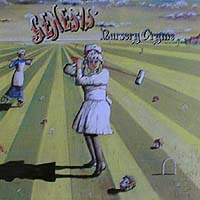Nursery Cryme
Produced by John Anthony
Released in November 1971
UK CHART POSITION #98 . . . UK RE-CHARTED POSITION #39 (1974) . . .
UK RE-CHARTED POSITION #68 (1984)

- TRACKS
- The Musical Box (10.27)
- For Absent Friends (1.48)
- The Return Of The Giant Hogweed (8.12)
- Seven Stones (5.09)
- Harold The Barrel (3.01)
- Harlequin(2.55)
- The Fountain Of Salmacis (7.56)
CREDITS
TONY BANKS - Organ, Mellotron, Piano, Electric Piano, 12 string guitar, Voices.
MICHAEL RUTHERFORD - Bass, Bass Pedals, 12 string guitar, Voices.
PETER GABRIEL - Lead Voice, Flute, Bass Drum, Tambourine.
STEVE HACKETT - Electric Guitar, 12 string guitar.
PHIL COLLINS - Drums, Voices, Percussion.
All titles published by Stratsong Ltd
Recorded at Trident Studios, London, August 1971
PRODUCED by JOHN ANTHONY
ENGINEERED by DAVID HENTSCHEL
TAPE JOCKEY - Mike Stone
SLEEVE DESIGN - Paul Whitehead. Inspired by "The Musical Box".
Remastered at The Farm and Abbey Road by Nick Davis, Geoff Callingham and Chris Blair
COMMENT
The first great Genesis album? They had clearly crawled beyond the pretty cages of Trespass,
fueled by the imagination of fairy-tale-fed minds. And yet for every audible precedent
(the role-playing vocals of “Harold The Barrel”) is an antecedent
(the timid, Trespass-like opening of “The Musical Box”).
I’ve always taken Nursery Cryme as an album in transition,
sometimes straying far into the woods yet dropping breadcrumbs back to Trespass lest they lose their way.
The addition of Phil Collins and Steve Hackett does change the sound of Genesis,
but no more than Peter Gabriel’s heightened sense of drama or Tony Banks’ increased use of the mellotron.
The wonder of Nursery Cryme is that the band so quickly lost their self-consciousness,
diving headlong into their art.
Writing a song like “The Return of The Giant Hogweed” took guts as much as talent,
as did “The Fountain of Salmacis.” It’s on these heavier tracks, epic in tone,
where a window into Foxtrot is found.
Listeners will quickly hear elements of “Get ‘Em Out By Friday” in the tale of the poisonous plant,
while Salmacis taps the same rich mythological vein that has provided the setting for subsequent
masterworks. Yet Nursery Cryme isn’t all elastic nightmares: “For Absent Friends”
is one of their prettiest songs, while “Harlequin” is the sort of medieval poesy you’d find on
Anthony Phillips’ The Geese And The Ghost. As good as these tracks are,
it’s the sublime “Seven Stones” that stays with me,
a song that would make my short-list of classic Genesis works.
The balance of light and dark tones
(and you can credit Collins and Hackett for much-needed contrast)
makes Nursery Cryme a more ambitious album than Trespass.
Compared to a Foxtrot or Selling England, this record may suffer from a little stiffness,
but it’s greatness in the act of creation

